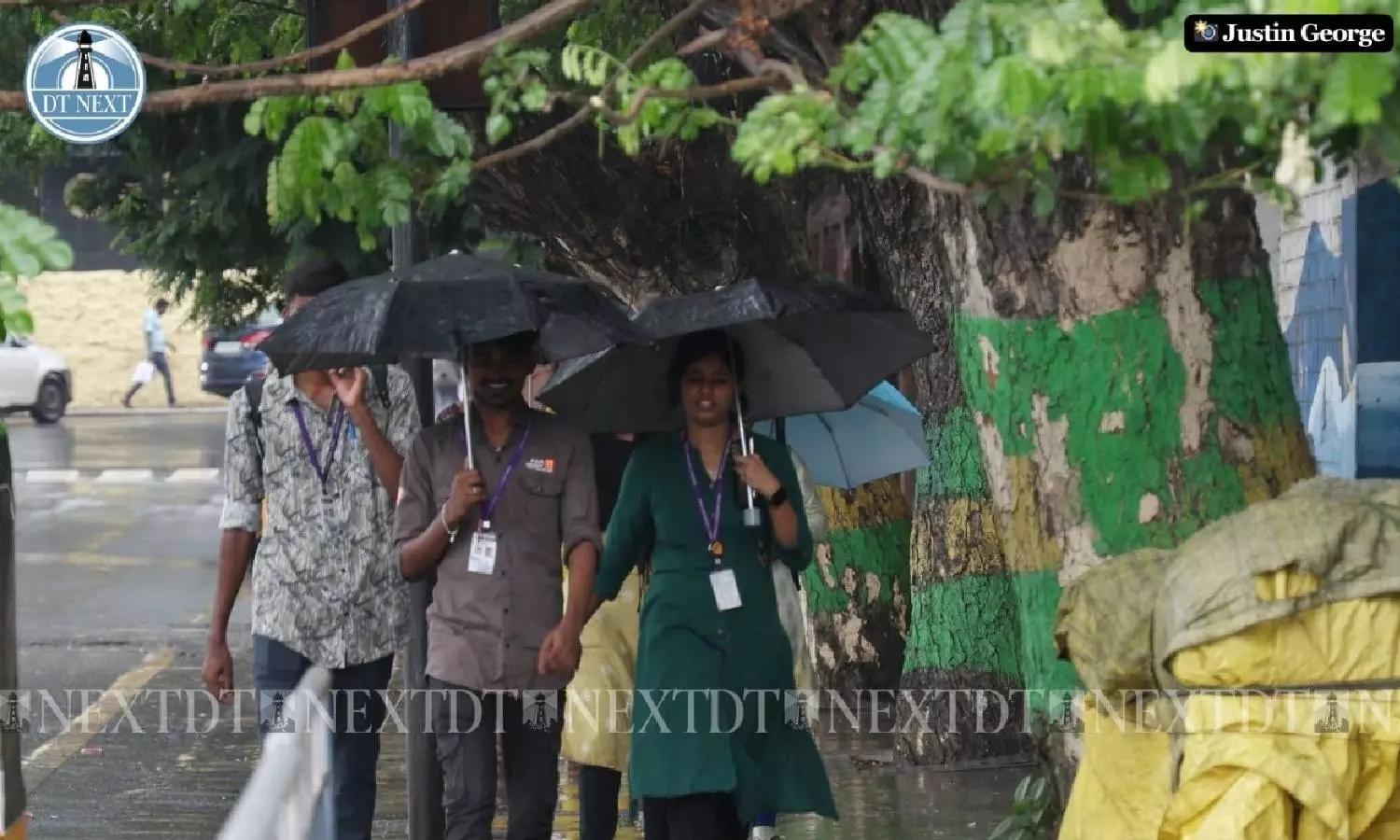


As cyclonic storm 'Fengal' approaches Tamil Nadu and Puducherry, heavy rain and strong winds have disrupted normal life in the region. Flight operations, public transport, and schools and colleges have been affected, with the IMD issuing a red alert for heavy rain. As a precautionary measure, the Tamil Nadu government has closed schools and asked IT firms to allow work from home for their employees. Cyclone Fengal is expected to make landfall near Puducherry around midday.
Cyclone Fengal: Threatens Tamil Nadu and Puducherry with Heavy Rain and Winds
Cyclone Fengal, a severe cyclonic storm, is approaching Tamil Nadu and Puducherry, bringing with it heavy rains, strong winds, and potential flooding. The Indian Meteorological Department (IMD) has issued a red alert for the region, warning of extremely heavy rainfall and rough seas.
Background
Cyclones are rotating, low-pressure storm systems that form over warm ocean waters. They are characterized by strong winds and heavy rainfall. Cyclones are common in the Bay of Bengal during the summer months, with the peak season occurring from April to December.
Impact of Cyclone Fengal
As Cyclone Fengal approaches land, it is expected to bring heavy rain and strong winds to Tamil Nadu and Puducherry. The IMD has predicted that rainfall could reach up to 20 centimeters (8 inches) in some areas. The storm is also expected to cause storm surges, flooding low-lying areas near the coast.
Precautionary Measures
Authorities in Tamil Nadu and Puducherry have taken precautionary measures to minimize the impact of Cyclone Fengal. Schools and colleges have been closed, and public transport has been suspended. The Tamil Nadu government has also advised IT firms to allow employees to work from home.
Top 5 FAQs
1. What is the expected landfall time and location of Cyclone Fengal?
Cyclone Fengal is expected to make landfall near Puducherry around midday.
2. What is the intensity of Cyclone Fengal?
Cyclone Fengal is a severe cyclonic storm, with wind speeds of up to 120 kilometers per hour (75 miles per hour).
3. What areas are most at risk from Cyclone Fengal?
The coastal districts of Tamil Nadu and Puducherry are most at risk from Cyclone Fengal. These areas include Chennai, Cuddalore, and Karaikal.
4. What precautions should people in affected areas take?
People in affected areas should stay indoors and away from windows. They should also secure loose objects and be prepared for flooding.
5. Has Cyclone Fengal caused any damage or casualties?
As of the latest reports, there have been no reports of damage or casualties caused by Cyclone Fengal. However, the storm is still approaching land, and the full extent of its impact may not be known until after it makes landfall.
Conclusion
Cyclone Fengal poses a significant threat to Tamil Nadu and Puducherry. Residents in affected areas should take necessary precautions to stay safe and minimize the impact of the storm. The IMD will continue to monitor the storm's progress and provide updates as needed.

A remote monitoring camera operated by the US Geological Survey captured stunning visuals of the recent volcanic eruption at Hawaii's Kilauea Volcano. The footage showed lava fountains up to 100 feet high and the raw power of nature as the lava eventually engulfed the camera. This eruption, known as Episode 38, was the latest in a series of eruptions that have been occurring since December last year. However, according to USGS, another episode could take place in the near future.

Indian Prime Minister Narendra Modi virtually inaugurated Skyroot Aerospace's new Infinity Campus in Hyderabad and unveiled their first orbital launch vehicle, the Vikram-I. During the event, PM Modi praised India's advancements in space technology and spoke about the importance of private companies like Skyroot in driving innovation in the space sector. The Infinity Campus, equipped with state-of-the-art facilities, has the capacity to produce one rocket per month, marking a significant milestone in India's private space manufacturing capability. Skyroot Aerospace, founded by former ISRO engineers, has quickly become a prominent player in India's growing space industry, with the successful launch of Vikram-S, the country's first privately built sub-orbital rocket.

We all experience changes in our mood, whether it's feeling happy and content or irritated and moody. But what are the underlying factors that contribute to these changes? This article from Medindia explores the top 10 things that can affect our mood, from physical health to environmental factors. It also provides tips on how to avoid these mood-altering triggers and maintain a positive state of mind. With a focus on promoting overall well-being, Medindia's policies align with the UN's Sustainable Development Goals, making it a reliable source of information for health and wellness.

A recent report by Public Health Scotland has shown a steep increase in flu cases and hospitalizations in Scotland. The numbers have more than doubled from the previous week, with a higher intensity observed in younger age groups. Experts are warning of a long flu season and a new variant of the illness that is spreading more easily. Health Secretary Neil Gray has assured the public that there are enough doses of flu vaccine available in the country.

The observation of National Pollution Control Day on 2 December serves as a timely reminder of India's struggle with escalating pollution levels. The recent years have seen a sharp increase in toxic particles and hazardous emissions, causing severe health issues and environmental damage. The ongoing pollution emergency calls for more stringent regulations, better urban planning, and increased public engagement to mitigate the crisis.

As World AIDS Day approaches, conversations around HIV prevention in India are becoming more open and informed. In particular, there is growing interest in PrEP (pre-exposure prophylaxis), a medicine that offers strong protection against HIV when used correctly. With rising awareness and more accessible sexual-health services, doctors are seeing a steady rise in patients asking about PrEP as a proactive health choice. This signals a shift towards informed prevention and a stigma-free dialogue surrounding HIV.

ISRO has been making continuous efforts to establish contact with the Vikram lander and Pragyan rover, which were put into sleep mode earlier this month, ahead of the lunar night. However, the prolonged spell of cold weather conditions, reaching up to -150 degrees Celsius, has made it difficult for them to wake up. With the sunrise on the Moon's south polar region and their solar panels believed to be optimally charged now, ISRO is hoping to revive the lander and rover and continue with their experiments and studies. The latest update from ISRO is that the plan to reactivate them has been delayed to September 23 due to the extreme lunar weather conditions.

Monsoon season may bring romantic vibes, but it's also a nightmare for contact lens wearers. Rainwater contains bacteria and pollutants that can cause eye infections, especially when wearing contact lenses. Ophthalmologists recommend using glasses instead and practicing good hygiene to avoid irritation and infection.

India's first human spaceflight mission, Gaganyaan, is one step closer to reality as ISRO successfully tested the main parachutes for the mission's Crew Module. The test, conducted at the Babina Field Firing Range in Uttar Pradesh, is part of the qualification process for the Gaganyaan parachute system. The system, which includes 10 parachutes of different types, is designed to ensure the safe and stable descent of astronauts returning to Earth. This milestone test marks a crucial step forward for India's ambitious space exploration goals.

As World Pneumonia Day is observed on November 12, experts are drawing attention to the dangerous link between air pollution and respiratory illnesses. In India, the post-Diwali smog adds to the already high levels of pollution, increasing the risk of pneumonia, particularly among vulnerable populations. While outdoor air pollution is often blamed, experts emphasize that poor indoor air quality also plays a significant role in triggering and worsening respiratory infections. Health professionals are urging for better air quality regulations and precautions to prevent this deadly connection between pollution and pneumonia.